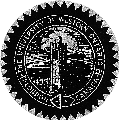 Mission and Vision
Mission and Vision
 Mission and Vision
Mission and Vision
Universities are special communities in which the curiosity of students and teachers motivates them to pursue knowledge for its own sake and for what it may yield. Knowledge - whether newly discovered or interpreted by senior researchers, or newly acquired by students preparing for a career - is a powerful agent of change in the lives of individual scholars and, through them, in society generally. The idea of the university has survived over nine centuries, not because it has existed in static isolation, but because it has continuously transformed itself to serve citizens and society well and effectively.
The world we are entering will be characterized by a knowledge-based society, marked by rapid changes in technology and an increased level of global competition. Canada must reach toward a position of leadership in that world. Learning - including both education and research - is the key to our future and the means by which Ontario and Canada will establish their place in the next century.
At the heart of social and economic health in the 21st century will be a recognition that our basic resources are not land, nor natural resources, nor unskilled labour, but rather are the knowledge and creativity of educated individuals. Whether we think of our city, our province, or our country, knowledge will be crucial to meeting the economic, social, and cultural challenges which our society will be facing over the coming decades. As institutions, universities must evolve to foster and sustain the vigorous pursuit of knowledge through teaching and research. A learning culture must therefore be both mindful of tradition and values and also responsive to new challenges and opportunities. In this way, the university best contributes to the larger society of which it is an integral part.
Change, then, is the very essence of the university's work, and any true university is itself in perpetual transition. The University of Western Ontario, since its founding in 1878, has evolved from its roots as an intellectual centre for one of Canada's most rapidly developing regions to become also an institution of national and international stature. The shape of its basic academic disciplines has evolved, as has that of its professional Faculties and Schools. Although universities are repositories of past learning, they must also be dedicated to shaping the future. This continuity, of a past that we honour and a future to which we commit, is distilled in our Mission:
The University of Western Ontario is dedicated to the advancement of learning through teaching and research and to the discovery and application of knowledge. The University seeks to provide an environment of free and creative inquiry within which critical thinking, humane values, and practical skills are cultivated and sustained. By pursuing these objectives, the University endeavours to serve the interests of society.The challenge to change which Western faces today is therefore not new or at all alien to its tradition. The challenge does, however, seem especially urgent now, in the face of shrinking public resources and basic questioning of the educational enterprise. Concerns have arisen within the University about maintaining, in an environment of severe resource constraints, the quality of research, teaching, and learning that we expect of ourselves.
Our response to this difficult environment should be a renewed commitment to academic quality. We intend that Western will become - and be seen to be - a markedly more vital and energetic centre of learning, creative questioning and problem-solving, research and teaching. Our commitment is to leadership in learning: we seek faculty who will be acknowledged leaders in their scholarly disciplines and who will ensure a quality of undergraduate and graduate education which will allow Western's graduates in their turn to assume leadership positions in public affairs, the scholarly world, the business world, the performing and fine arts, the professions, community organizations, and the many other areas of endeavour to which they aspire. Our basic strategic objective is expressed in our Vision:
By supporting academic distinction, Western will achieve a place in the first rank of major Canadian universities and, in selected areas, be the leader.The Task Force identifies undergraduate and graduate education and research (broadly interpreted to include creative activity) as the areas in which a university can most profoundly interact with society. Furthermore, we re-affirm that the essential interaction of undergraduate education and research is to be cultivated. Western can make the most dramatic advances toward realizing its Vision by enriching the experience of its newest scholars, by extending the impact of the work of its established scholars, and - perhaps most important - by fresh and dynamic syntheses of those endeavours.